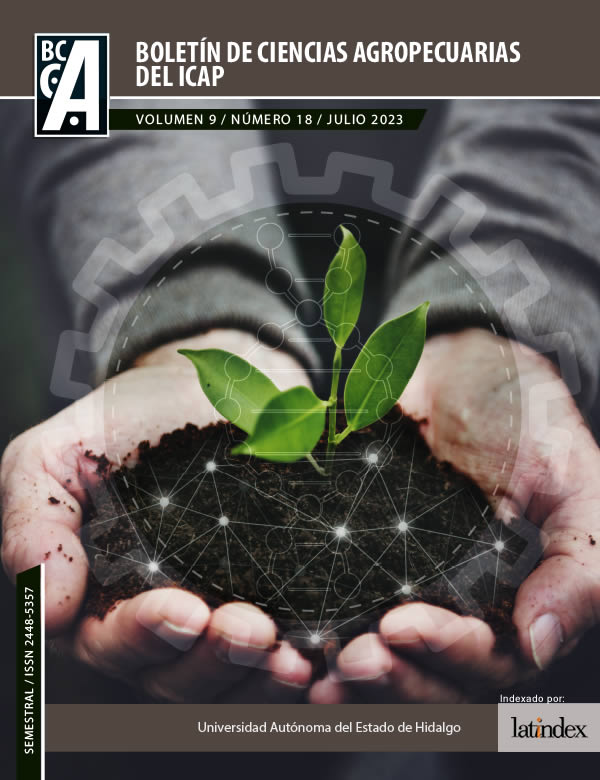Impact of functional compounds in food as aids in the prevention and treatment of COVID-19: a review
Abstract
Since the first positive case for COVID-19 was confirmed in Mexico, the country aggravated its health crisis due to multiple factors such as people's poor health condition, the prevalence of multiple chronic diseases, the negative change in eating behavior and the triggering of unhealthy diets in the population, as a consequence, this has made them more vulnerable to contracting this disease, increasing the chances of developing serious complications. That is why nutritional therapies, such as immunonutrition, have been key to its prevention and treatment, the investigation of compounds with biological activity in food such as vitamins, minerals and phytochemicals, are associated with improvement in respiratory and inflammatory conditions because they help regulate the body's immune response, probiotics, due to their effects on the immune mechanisms of action in the gastrointestinal and respiratory systems, are important for the development of treatments, increasing the production of immunoglobulins, among others, demonstrating the importance of the use of these compounds acting on the immune system and thus help prevent or slow the spread of viral infections like the one we live today.
Downloads
References
Hernández-Bringas H. Mortalidad por COVID-19 en México: notas preliminares para un perfil sociodemográfico. Centro Regional de Investigaciones Multidisciplinarias, UNAM 2020.
Escudero X, Guarner J, Galindo-Fraga A, Escudero-Salamanca M, Alcocer-Gamba MA, Río CD. The SARS-CoV-2 (COVID-19) coronavirus pandemic: current situation and implications for Mexico. Archivos de Cardiología de México 2020: 90(01), 7-14.
Hernández-Galdamez D, Rivera-Andrade A, Morales-Juárez A, Ramirez-Zea M, Mendoza-Montano C. ¿Qué consecuencias tiene la pandemia por covid-19 en las enfermedades crónicas no transmisibles y cómo reducirlas?. Instituto de Nutrición de Centro América Y Panamá–INCAP 2020; 1-17.
Valdés MÁ. Las enfermedades crónicas no transmisibles y la pandemia por COVID-19. Revista Finlay 2020; 10(2), 78-88.
Cruz AMB. Seguridad alimentaria en los hogares durante la fase 3 de la pandemia por coronavirus en México. RD-ICUAP 2021; 7(19), 105-116.
Flores M. Covid-19: alimentación, salud y desarrollo sostenible. Descarga de responsabilidad 2020; 195.
Kimura-Ovando Á. Alimentos funcionales. Medicina Interna de México 2021; 36(S4), 8-10.
Rojas JJH, Tellería WMY, Quintana ADB, Manyari LCR, Puertas SJG, Gamboa JLV, López MV. Alimentos con potencial efecto inmunomodulador y antiviral a propósito de la pandemia covid-19. Perspectivas en Nutrición Humana 2021; 23(2).
Rico AS, Núñez AM, Carús AT, Biruete A, Loeza AS, García CO. Atención y Recomendaciones de Alimentación y Nutrición en México. Conexión Nutrición 2020. Obtenido de https://www.anahuac.mx/mexico/files/2020/04/Recomendaciones-de-Alimentacion-y-Nutricion-COVID-19.pdf
Benarroch A, Pérez S, Perales J. Factores que influyen en las conductas alimentarias de los adolescentes: Aplicación y validación de un instrumento diagnóstico. Electronic journal of research in educational psychology 2011; 9(3), 1219-1244.
Castro ÁM, Martínez JJR, Fernández GCC. Factores de riesgo para trastornos del comportamiento alimentario. Revista Ciencias Biomédicas 2012; 3(2), 300-305.
Olvera MGA. El régimen agroalimentario ante la pandemia por covid-19: construcción de la vulnerabilidad en México. Política y Cultura 2021; 55, 31-50.
Vergara Castañeda A, Lobato Lastiri MF, Díaz Gay M, Ayala Moreno MDR. Cambios en el comportamiento alimentario en la era del COVID-19 2020.
Zapatera B, Prados Bo A, Gómez Martínez S, Marcos A. Immunonutrition: Methodology and applications 2015.
Páez MC, Jaeger AS, Solano L. La inmunonutrición. Salus 2012; 2, 5-8.
Gurrutxaga HS, Lagranja GC, Peláez RB. Nutrientes e inmunidad. Nutr Clin Med. 2016; 10(1), 1-19.
Jayawardena R, Sooriyaarachchi P, Chourdakis M, Jeewandara C, Ranasinghe P. Enhancing immunity in viral infections, with special emphasis on COVID-19: A review. Diabetes & Metabolic Syndrome: Clin. Res. Rev. 2020; 14(4), 367-382.
Quiñones M, Miguel M, Aleixandre A. Los polifenoles, compuestos de origen natural con efectos saludables sobre el sistema cardiovascular. Nutr. Hosp. 2012; 27(1), 76-89.
Vásquez HEA. Inmunomodulación nutricional y covid-19. Enfermería Investiga 2021; 6(4), 58-64.
Huang Z, Liu Y, Qi G, Brand D, Zheng SG. Role of vitamin A in the immune system. Journal of clinical medicine 2018; 7(9), 258.
Flores-Silva CH, Arroyo-Sánchez AS. Vitamina C y enfermedad por coronavirus 2019: Una revisión de la literatura. Revista del Cuerpo Médico Hospital Nacional Almanzor Aguinaga Asenjo 2020; 13(4), 427-439.
Hernandez A, Papadakos PJ, Torres A, González DA, Vives M, Ferrando C, Baeza J. Dos terapias conocidas podrían ser efectivas como adyuvantes en el paciente crítico infectado por COVID-19. Revista Española de Anestesiología y Reanimación 2020; 67(5), 245-252.
Lewis ED, Meydani SN, Wu D. Regulatory role of vitamin E in the immune system and inflammation. IUBMB life 2019; 71(4), 487-494.
Jano M I. Efectos de la vitamina D en la prevención y tratamiento de la Covid-19 2021.
Szarpak L, Rafique Z, Gasecka A, Chirico F, Gawel W, Hernik J, Szarpak, L. A systematic review and meta-analysis of effect of vitamin D levels on the incidence of COVID-19. Cardiology journal 2021.
He LH, Ren LF, Li JF, Wu YN, Li X, Zhang L. Intestinal flora as a potential strategy to fight SARS-CoV-2 infection. Frontiers in Microbiology 2020; 11, 1388.
Creus EG. Alimentos prebióticos y probióticos: la polémica científica sobre sus beneficios. Offarm: farmacia y sociedad 2004; 23(5), 90-98.
Antunes AE, Vinderola G, Xavier-Santos D, Sivieri K. Potential contribution of beneficial microbes to face the COVID-19 pandemic. Food research international 2020; 136, 109577.
Baud D, Dimopoulou Agri V, Gibson GR, Reid G, Giannoni E. Using probiotics to flatten the curve of coronavirus disease COVID-2019 pandemic. Frontiers in public health 2020; 8, 186.
Su M, Jia Y, Li Y, Zhou D, Jia J. Probiotics for the prevention of ventilator-associated pneumonia: a meta-analysis of randomized controlled trials. Respiratory care 2020; 65(5), 673-685.
De las Cagigas Reig AL, Anesto JB. Prebióticos y probióticos, una relación beneficiosa. Revista Cubana Aliment Nutr 2002; 16(1), 63-8.
Di Pierro F. A possible probiotic (S. salivarius K12) approach to improve oral and lung microbiotas and raise defenses against SAR S-CoV-2. Minerva medica 2020; 111(3), 281-283.
Copyright (c) 2023 Marycarmen Cortes-Hernández, Rafael Germán Campos-Montiel, Gabriel Aguirre-Álvarez, Melitón Jesus Franco-Fernández, Antonio de Jesus Cenobio-Galindo

This work is licensed under a Creative Commons Attribution-NonCommercial-NoDerivatives 4.0 International License.









